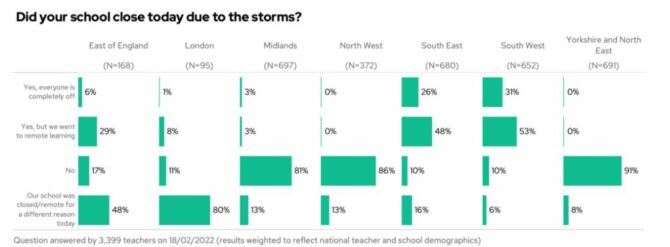Two-thirds of schools forced to close due to safety concerns amid raging storms kept pupils learning with remote lessons – suggesting snow days are over.
The technological advancement brought about due to Covid has been called a “silver lining of the pandemic” which allows schools to “seamlessly move from in-class to remote learning”.
However, some leaders remain sceptical whether such measures would be used for a single snow day – and may get a “frosty reception” from pupils.
Schools were forced to close during heavy winds, rain and snow as storms Dudley, Eunice and Franklin ripped across the country.
While around half of schools were closed last Friday due to half-term, a rare ‘red’ wind warning from the Met Office during Storm Eunice prompted a number of schools to close.
Teacher Tapp statistics found that 90 per cent of schools in the south west and south east closed, while the majority of northern schools remained open.
Of the schools which did close, two-thirds offered remote-learning to their pupils. The south west reported the highest levels of remote learning at 53 per cent, followed by 48 per cent in the south east and 29 per cent in the east of England.

Schools Week previously reported that Somerset and North Somerset councils had advised schools to switch to home learning. Closures were also announced in Devon, Cornwall and Gloucestershire.
Access to online school triples during storm
If schools are unable to switch to their own remote learning offer, pupils can also continue learning through Oak National Academy.
Figures seen by Schools Week show pupil figures tripled for the online school on Friday to 120,000, when compared with the previous week. This falls just short of its record high day of 130,000 on January 5 – which peaked due to the spread of the Omicron variant.
Activity was greatest in the south west and south east.
Oak principal Matt Hood said the figures show the online school is a “very popular back-up at short notice when classroom teaching isn’t possible”.
“It’s testament to teachers and school leaders, and a real silver lining of the pandemic, that pupils can now seamlessly move from in-class to remote learning when they are unable – in this case because of Storm Eunice – to get to school.”
‘It limits how much pupils miss out’
On Monday, St Benedict’s High School, in Whitehaven, Cumbria, was forced to close after a number of roof panels from outdoor shelters were dislodged during Storm Franklin.
The panels measured eight foot long and posed a significant safety risk to pupils.
Deputy headteacher Steve Bridgman explained the school was immediately able to provide live online lessons for pupils – the first time it has used the technology for non-Covid related absence.
He added the switch had been “very successful” and “limits how much pupils miss out.”
Ofsted research conducted last year suggested remote education will be used in the future to provide teaching during snow days.
End of snow days would receive ‘frosty reception’
At Coates Lane Primary School in Barnoldswick, Lancashire, remote live lessons are being provided for the Year 3 cohort after storm damage caused their classroom’s roof to collapse.
Headteacher Sarah White said that while the live teaching is “the best option we have”, it did place additional strain on parents having to log on and facilitate home learning.
Despite its success, White is unsure whether the school would move to a remote learning model for a snow day, saying it would be “about judging on the day”.
“If the school had to shut for a week due to snow, we would use remote teaching. But if it was one random day off you would hope that the children would enjoy the snow and have fun”.
Geoff Barton, general secretary of the Association of School and College Leaders (ASCL) added: “The extent to which remote education can be applied to events that are by their nature short and unpredictable remains to be seen, and corralling children online who are determined to have fun in the snow may receive a frosty reception.”












Your thoughts